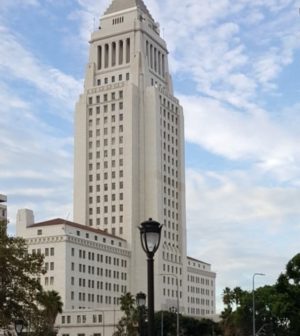Calls for immediate action to support small businesses, including $575 million on top of the $500 million previously allocated to California’s Small Business COVID-19 Relief Grant, bringing total support to more than $1 billion
SACRAMENTO – Governor Gavin Newsom today previewed his Equitable Recovery for California’s Businesses and Jobs plan, the business and workforce recovery elements of his 2021-22 State Budget that will help California through the COVID-19 pandemic and advance an equitable, broad-based recovery.
Watch the Governor provide a brief overview of his Equitable Recovery for California’s Businesses and Jobs plan here.
Building on actions the state has taken to support California’s businesses throughout the pandemic, including emergency aid and regulatory relief, these proposals double down on the Newsom Administration’s commitment to rebuilding the economy, with investments across sectors and benefits for businesses of all sizes.
Notably, the Budget proposes an immediate action to approve $575 million more for California’s small businesses, the backbone of the state’s economy, as they work to adapt their operations amid the COVID-19 pandemic. This immediate action proposal is on top of the initial $500 million allocated in partnership with the Legislature to the California Small Business COVID-19 Relief Grant, bringing the total for California’s small businesses to more than $1 billion.
“California’s economy is known the world over for our innovation, inclusion and resilience. That spirit will carry us through this pandemic and beyond,” said Governor Newsom. “These budget proposals reflect our commitment to an equitable, broad-based recovery that ensures California remains the best place to start and grow a business – and where all Californians have an opportunity to reach their dreams. I look forward to continuing to partner with the Legislature to advance these priorities so our economy can emerge stronger, fairer and more prosperous than before.”
The COVID-19 pandemic brought unprecedented challenges to California. However, prudent fiscal management in the past and present has allowed California to provide ongoing support to impacted Californians where they need it most.
Building on supports for California businesses before, during and through the pandemic, the Governor today previewed the following budget proposals:
Small Business Grants
Prior to the pandemic, small businesses created two-thirds of new jobs and employed nearly half of all private-sector employees. California is home to 4.1 million small businesses that employ nearly half of the state’s total workforce. To help keep these businesses afloat, the Governor is proposing a total of $1.075 billion for the State’s Small Business COVID-19 Relief Grant Program.
To put money into the hands of the most impacted small businesses as quickly as possible, the Governor has proposed immediate legislative action on $575 million in additional grants. The investment will add to the initial $500 million allocation announced in November. The Program offers grants up to $25,000 to micro and small businesses that have been impacted by the pandemic. These grants will be distributed across the state, with priority given to regions and industries impacted by the COVID-19 pandemic, disadvantaged communities and underserved small business groups.
The $575 million Early Action Budget proposal includes $25 million for small cultural institutions, such as museums and art galleries, that have been constrained by the pandemic in their ability to educate the community and remain financially viable.
California Jobs Initiative
The Budget also proposes sustained investments to preserve California’s competitiveness. The California Jobs Initiative, a $777.5 million proposal, focuses on job creation and retention, regional development, small businesses and climate innovation, including increased funding for:
- California Competes Tax Credit (CalCompetes), which incentivizes businesses to locate in California to stay, grow and create quality full-time jobs in the state and creates a new CalCompetes grant program to support job creation and investments in infrastructure ($430 million)
- Extended Main Street Small Business Tax Credit to encourage hiring new employees and rehiring former employees ($100 million)
- As of January 4, almost 9,000 taxpayers had reserved over $54 million of the existing credit
- Mitigating the SALT deduction limitation for S-corporation shareholders
- The California Dream Fund to seed entrepreneurship and small business creation in underserved communities ($35 million)
- Additional funds for the California Infrastructure and Economic Development Bank’s (IBank) Small Business Finance Center to provide small business loan and disaster loan guarantees ($50 million which will be leveraged to provide $250 million in loans) and for the California Rebuilding Fund ($50 million)
- Expanded sales tax exclusions through the Treasurer’s Office to reduce the cost of manufacturing equipment in order to promote innovation and meet the state’s climate goals ($100 million)
This funding also includes $12.5 million allocated, in partnership with the Legislature, in late 2020 to fully capitalize the California Rebuilding Fund to support $125 million low-interest loans to underserved businesses.
Workforce Development
The Budget proposes one-time and ongoing investments totaling $353 million to support California’s workers as they adapt to changes in the economy brought about by COVID-19. These investments lift up proven workforce development strategies like apprenticeship and High-Road Training Partnerships and encourage greater collaboration and coordination among California’s institutions of higher learning and local workforce partners. Demand-driven workforce programs can help California train the workforce of the future in key sectors including health care and technology.
Fee Waivers
The Budget proposes $70.6 million for fee waivers to individuals and businesses most impacted by the pandemic – including barbers, cosmetologists, manicurists, bars and restaurants. These waivers will assist those who have not been able to operate or are operating at reduced capacity during the pandemic.
Deferred Maintenance
In recognition of the job-creating potential of infrastructure projects on state-owned properties, the Budget includes a $300 million one-time General Fund for the most critical statewide deferred maintenance, including greening of state infrastructure. This proposal will help create jobs in California while achieving our state’s climate goals. Projects include the installation of electric vehicle charging stations at state-owned facilities.
Housing
Through the Infill Infrastructure Grant (IIG) Program, this Budget proposes $500 million to create jobs and long-term housing development to unlock more than 7,500 new permanently affordable homes for Californians. IIG grants to local governments and developers bring the cost down for new housing by defraying costs for things like sewers, roads and site preparation, all while putting thousands of people to work in good jobs building this housing-related infrastructure. $250 million of these funds are proposed for early action.
Zero-Emission Vehicles and Zero-Emission Vehicle Infrastructure
Building on California’s historic commitment to requiring sales of all new passenger vehicles to be zero-emission by 2035, this Budget proposes an additional $1.5 billion investment to accelerate our state’s progress toward these goals while creating jobs. The proposal will support jobs and economic growth and provide air quality benefits and support for low-income Californians to purchase cleaner vehicles. Funds will support purchases of clean trucks, buses and off-road freight equipment and Clean Cars 4 All programs. It will also support job-creating construction of electric charging and hydrogen fueling stations necessary to accelerate zero-emission vehicle adoption. The Budget proposal will leverage additional private sector capital to build the necessary infrastructure and create jobs to support California’s recovery.
These 2021-22 Budget proposals build on the Newsom Administration’s work to support California’s businesses and workers. Among many actions, the Administration waived the $800 minimum franchise tax – often a costly barrier for start-up businesses – for the first year of operation. The Administration in November also extended up to billions in immediate, temporary tax relief to businesses impacted by COVID-19 by extending deadlines for paying sales taxes for smaller businesses and expanding interest-free payment options for larger businesses particularly affected by significant restrictions on operations due to COVID-19.
Additionally, the Administration built and funded the Great Plates Delivered program, a first-in-the-nation program that partners with local businesses to deliver nutritious meals to older Californians and other adults at high risk from COVID-19, which has supported more than 9,000 jobs per week on average.





